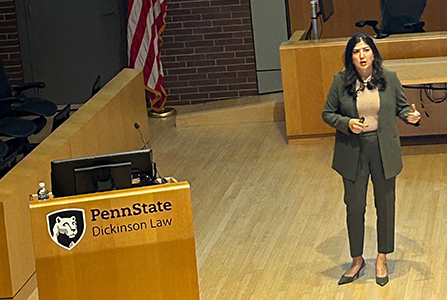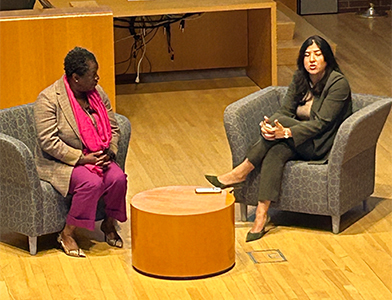HOW PENN STATE DICKINSON LAW’S ‘RACE AND THE EQUAL PROTECTION OF THE LAWS’ COURSE LAYS THE FOUNDATION FOR AN ANTIRACIST LEGAL EDUCATION
November 2024 — Throughout each academic year, the first-year students at Penn State Dickinson Law gather in the Apfelbaum Family Courtroom and Auditorium for pivotal events in their legal education. Early on, they assemble for convocation, when they take a pledge to safeguard the ideals of honor and integrity. Later, they return for the “Race and the Equal Protection of the Laws” (REPL) class, which teaches the historicity of race and racism in the United States and the impact of systemic inequity on our system of laws.
REPL, a required course for all first-year Penn State Dickinson Law students, invokes critical theory and critical pedagogy, aiming to transform how students see their place and role in an imperfect and still-evolving democracy. The class began in fall 2020, months after the murder of George Floyd prompted the Penn State Dickinson Law faculty to pass two unanimous resolutions. The first condemned violence against people of color. The second adopted an antiracist approach to legal education, leading to the creation of REPL.
“We teach REPL at such an important time, the very beginning of law school, because it allows us to understand our past so that we can be guided to a stronger rule of law premised on the nation’s Second Founding,” said Penn State Dickinson Law Dean and Donald J. Farage Professor of Law Danielle M. Conway. “There is no time like the present to understand the impact of the Fourteenth Amendment to a multiracial, multiethnic, multicultural, and intersectional liberal democracy.”
Indeed, REPL lays the foundation for an antiracist legal education at Penn State Dickinson Law. It is held three times per semester.
While the presentation of REPL keeps pace with changes in law and society, the vision remains focused on the core values of equality and justice for all through the lens of a historical, synthetic understanding of the Fourteenth Amendment: students gain a critical awareness of the intersections between and among race, equal protection under the law, and the U.S. legal system more broadly. “Through REPL, many law students are being exposed for the first time to the structure that supports the nation’s constitutional democracy. REPL allows us to teach that through the lens of enslavement and racism, systemic challenges that have existed since the beginning of our society. We use critical pedagogy to analyze how a governing system founded on a pledge of democratic ideals produces systemic inequity when legal, social, economic, and civil obstacles limit liberty for those othered in society,” said Conway, who attends every REPL session.
Penn State Dickinson Law Associate Dean for Antiracism and Critical Pedagogy Shaakirrah R. Sanders, who co-teaches REPL with Associate Dean for Academic Affairs Jeffrey A. Dodge, noted that professors do not always have the opportunity in traditional law school curriculum to “sew these pieces together and reveal a lot of these underground roots of racism in the legal system. You can only dig so deep in most classes. But here, we can dig very deep and uncover a lot of the roots.”
REPL is not just for 1Ls. All Dickinson Law faculty and staff members are invited to each session. Sanders and Dodge also solicit faculty and staff pitches for session topics. “This is a faculty-student experience unlike other classes,” said Dodge. “Class sessions include our staff in the teaching and learning process, including those with expertise outside of law like on our administrative and technical services staff. Everyone in the community is invited to contribute in ways that draw on their knowledge, lived experiences, and interests.”
Difficult but necessary conversations
Many students consider the course critical to their legal education. Some say REPL transformed their worldview. Dodge shared the story of a student with little interest in taking the class before it began because she thought the topics would not relate to her. “She said that by the end of the course, she had learned more about our country’s real history and the rule of law than she had in any other educational space,” said Dodge. The student later contributed to a REPL course session in her third year and decided to integrate addressing racial justice inequities into her professional goals in practice.
Joshua Hanson ’25 found REPL so compelling that he joined the REPL Student Advisory Committee (SAC), a group of 2Ls and 3Ls who offer feedback on the course. “If we are going to make the world, or at least our legal system, better, we must know our true history and true beginnings. Understanding the racial context of laws is very, very important,” said Hanson, current president of the Student Bar Association.
REPL’s iterative nature allows Sanders and Dodge to not just listen but also respond to students’ concerns, including candid criticism that has inspired changes. “I had a good experience in the class. But some Black students and other students of color who have lived with racial discrimination and its impacts their entire lives felt they had to educate classmates about some topics, which was a tall order,” said SAC member Romario R. Ricketts ’25, last year’s Black Law Students Association (BLSA) president.
Madison M. Jackson ’25 joined SAC to help future 1Ls have a better experience with the class. “Many of us recognize the critical reason why REPL was created, but it often did not feel like a safe space for me. I wanted to ensure that future Black students and students of color would not face this predicament,” said Jackson, who served as social/community service chair of BLSA last year. After speaking with fellow students, some of whom shared similar experiences, she created the survey “Capturing the 1L REPL Experience,” inviting all students to offer feedback on their REPL experiences.
The survey sought opinions on a range of questions related to the class. Sanders and Dodge lauded Jackson’s initiative and noted the strong response to the survey — more than 40 students filled it out. “The very valuable input generated by the survey helped us determine what types of changes we would make to the class,” said Sanders. “We received thoughtful, detailed feedback that we would not see in a traditional evaluation.”
Evolving and improving the course
Dodge and Sanders have used the feedback to implement changes. They switched class time from Wednesday evenings to Friday mornings based on student preference. They increased the size of breakout groups sometimes used to discuss a particular topic, responding to concerns raised in the survey by students of color about representation.
This year will also feature more guest speakers, the model students said they found most engaging. “When I looked at the survey responses, it clicked that people liked the class and concepts, but they felt they would be more impactful with the community perspective,” said Jackson, who recently became a teaching assistant for REPL.
Confirmed speakers for this year include Eddie Glaude Jr., Princeton University; Jacqueline De León, staff attorney at the Native American Rights Fund; Marissa Jackson Sow, University of Richmond School of Law; Luis Cortes Romero, the first undocumented lawyer to appear before the Supreme Court; and multiple Penn State Dickinson Law and Penn State Law faculty members. REPL’s final session will feature a panel of judges, including Hon. Micaela Alvarez, United States District Court for the Southern District of Texas, and Hon. Ivan L.R. Lemelle, United States District Court for the Eastern District of Louisiana.
To support community building, each REPL session now begins with a community breakfast in the commons provided by the Office of Student Services. Sanders and Dodge believe adding time for coffee and conversation helps strengthen relationships that make sharing in class easier.
Each year’s REPL has a theme. Last year, it was the intersection of education and the history of Carlisle, including the Native American boarding schools. This year, voting rights seemed an obvious choice with November’s presidential election. In the spring, the course sessions will focus on immigration and national security. Next year will be criminal justice.
During the first class, Dodge encouraged students to practice self-care during REPL. “We want you to be challenged to engage in difficult conversations and learn about new things. But we also know that your mental health is important, so be sure to make space for yourself in this process as well,” said Dodge.
Laying a foundation for future classes
Students said REPL has changed their perspective on the rule of law. “Taking ‘Administrative Law’ in my second year, I thought about how race affected different people’s access to justice or ability to navigate the administrative state. It is eye-opening to see the different ways race can affect things you may not even think of having a racial implication and think critically about those effects,” said Hanson. “I am glad to go to a school that emphasizes learning about these things.”
Ricketts agrees. “It is an important course, especially at a time when many states are suppressing conversations about race and diversity, equity, inclusion, and belonging. If you are going to cultivate antiracist lawyers, then they must know our history and understand how the law has historically been weaponized against certain groups of people,” said Ricketts. “They must know how they can contribute to fighting against that weaponization to create a more just legal system.”

